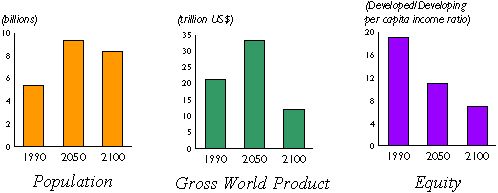- Previous message: Michael M. Butler: "Re: Invitation to Join The Constand Society"
- Messages sorted by: [ date ] [ thread ] [ subject ] [ author ] [ attachment ]
Yes, it ain't a very extropian view in the rah-rah sense. But it's a
concise depiction of a consequence of loss of comity that I have found
plausible as one
path for quite some time (ever since reading _Engines of Creation_, in
fact). Especially the tension between crank actors and sitting ducks.
Everyone's a target now, potentially; and this has been so to some degree
since the 1970s,
even before the emergence of a "sole superpower".
Sucks, rather.
> Social Breakdown Scenario
>
> http://www.hf.caltech.edu/hf/b3/scenarios/ggroup/sc_ba-bd.html
>
> Scenario Outcome
>
> Technological Growth Global Environmental Impact Local
> Environment Impact Conflict
> low low high
> high
>
>
> In this scenario, the degree of conflict and rivalry between the
> different
> international actors has become so high that no long-term concerted
> actions
> are possible. Chaos rather than coherence becomes the order of the day.
>
> The high incidence of random violence (from disaffected individuals, from
> organized terrorist groups, or from economic conflicts such as wars
> between
> drug dealers or corporations) diverts resources from economic growth to
> security concerns, both on a personal and a national level. Despite these
> efforts, the breakdown of civil order and ensuing chaos becomes
> widespread,
> especially where significant portions of the population are highly
> stressed
> and governments are weak and fragile. The refugees fleeing from one
> disaster
> help to destabilize their neighbors.
>
> Reaction to migrants in both rich countries and rich regions of poor
> countries becomes a dominating political concern, focusing resources on
> police powers, border fences and guards, monitoring of the movements and
> activities of citizens, and ultimately limiting or obstructing trade and
> travel. Globalization largely collapses, except for the media that bring
> everyone fresh news of disaster and conflict. Such changes are
> particularly devastating for industrial economies highly dependent on
> trade and on
> imported natural resources. The result is rising unemployment,
> depressions,
> political instability, and outbreaks of civil disorder even in rich
> countries.
>
> This chain of events eventually leads to a generalized collapse of
> social,
> cultural, and political institutions, deindustrialization (to varying
> degrees in different regions), and in large parts of the world a return
> to
> semi-tribal or feudal societal structures. With the collapse of markets
> and
> of investment generally, technological progress halts too--and the level
> of
> technological capability regresses. Famines and epidemics become common.
> Equity increases somewhat only because everybody gets poorer.
>
> Population size is a critical uncertainty. It could keep growing in poor
> regions for some time, in a vicious circle of poverty and high birth
> rates.
> Eventually, however, it decreases, both from higher mortality rates and
> from
> the drastic reduction/degradation of the natural resource base available
> to
> support the world's population. Many couples, pessimistic about the
> future,
> choose not to bring children into the world.
>
> The conditions of this Breakdown scenario could persist for many decades
> before social evolution to higher levels of civilization again becomes
> possible.

- Next message: Samantha Atkins: "Re: POLITICS/CURRENT EVENTS: Non-Solution Unsatsfactory, Fwd: More on Lee Harris: Andrew Sullivan"
- Previous message: Michael M. Butler: "Re: Invitation to Join The Constand Society"
- Messages sorted by: [ date ] [ thread ] [ subject ] [ author ] [ attachment ]
This archive was generated by hypermail 2.1.5 : Sat Mar 15 2003 - 13:45:54 MST